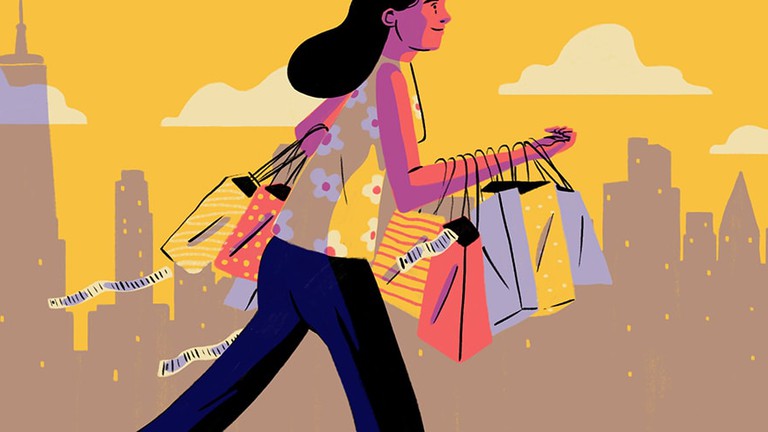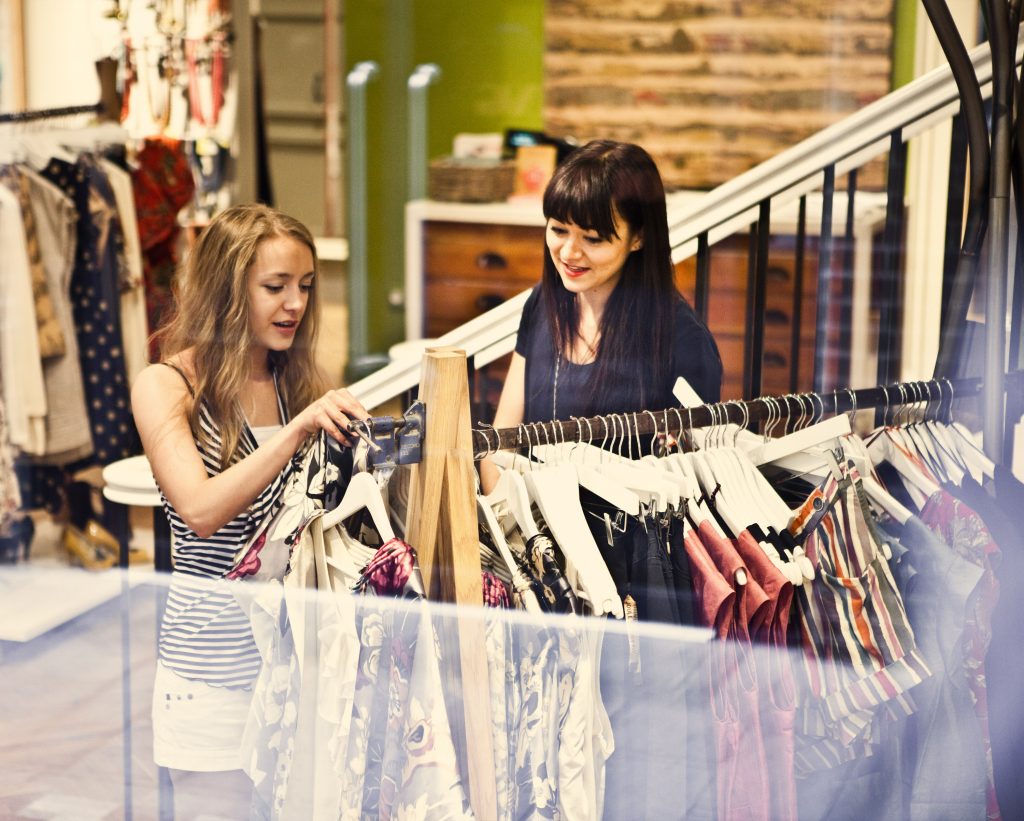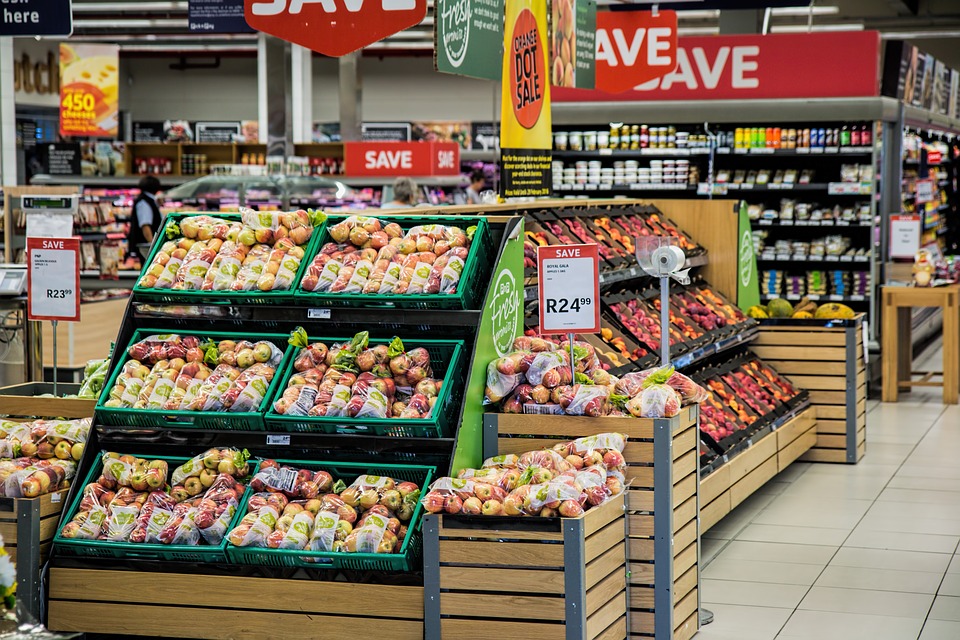Có phải các bạn là tín đồ của Shopping? Nếu ở phần thi Writing task 2 gặp phải chủ đề shopping thì bạn sẽ xử lý như thế nào? Hôm nay duhoctms.edu.vn sẽ cập nhật cho các bạn vốn từ vựng chủ đề Shopping (Shopping vocabulary) đậm chất IELTS, hy vọng sẽ giúp ích cho bạn nhé!
1. Từ vựng chủ đề Shopping – Shopping vocabulary
1.1. Going to shopping – Shopping vocabulary
- Go shopping/ do the shopping: đi mua sắm
- Goods/ commodity: hàng hóa

Ví dụ: Electronic commodities such as computers and equipment have fallen dramatically in price since their introduction to the market.
- An impulse buy: kiểu mua sắm bất chợt
Ví dụ: Foreign visitors are the result of targeted or un-targeted advertisements that may lead to impulse buys that fulfill desires for luxury or non-essential items.
- Bargain hunting: tìm kiếm những sản phẩm có giá hời
- Shopaholic: người nghiện mua sắm
- Internet shopping/ online shopping: mua sắm trực tuyến, trên mạng
Ví dụ: The increase in internet shopping is leading to many local shops closing down
- Window shopping: Đi ngắm đồ tại các cửa hàng
- Customer service: dịch vụ khách hàng
- Promotion: chương trình giảm giá
Ví dụ: The chain chose to concentrate very heavily on in-store promotions.
- Pre-holiday sale: mùa giảm giá trước các kỳ nghỉ lễ.
Ví dụ: There are a number of discounted products and services in pre-holiday sales such as Christmas and New Year.
1.2. People
- Shopper/ customer: khách hàng/ người mua sắm
- Market trader: thương buôn
- Manufacturer: nhà sản xuất
Ví dụ: With the purpose of pleasing customers, manufacturers usually distributed small gifts to customers in some special occasions.
- Advertiser: Nhà quảng cáo
1.3. Types of shops

- Shop/ store/ retail outlet/ retailer: các cửa hàng bán lẻ
- Shopping mall/ department store/ shopping centre: trung tâm thương mại
Ví dụ: For many, shopping malls are great places to spend their leisure time and meet others. People, however, in the past mostly visited those when necessary.
- Chain store: chuỗi cửa hàng
Ví dụ: These days, most towns in the UK are full of chain stores and there are very few independent retailers left.
- Independent stores: những shop tư nhân (không được quản lý bởi các công ty lớn)
Ví dụ: There are several reasons why people would rather go to shopping malls than independent stores but the most important one perhaps the convenience. There are a myriad of shops in a shopping center so that people can easily hit different shops and get what they need without having to travel a long distance.
- Supermarket: siêu thị
- Grocery: tiệm tạp hóa
- Greengrocer: tiệm bán rau, hoa quả
- Butcher: cửa hàng bán thịt
- Bakery: tiệm bánh
- Drugstore: tiệm thuốc và các sản phẩm các nhân khác
- Newsagents: sạp báo
- Bookshop: hiệu sách
- Market/ flea market: chợ/ hội chợ
- Multi – complex building: tòa nhà phức hợp nhiều tầng (tích hợp nhiều loại hình giải trí)
Ví dụ: Time-saving from shopping from such multi-complex buildings could be a significant factor.
- Online stores/ physical stores: cửa hàng trực tuyến/ cửa hàng không trực tuyến
Ví dụ: The vital reason for the closure of physical stores in the future is that consumers are quite satisfied with the unique shopping experience provided by online sites.
1.4. Buying things
- Buy/ purchase/ consume: mua/ tiêu thụ
Ví dụ: Purchasing things that people do not need is a habit that makes them greedy and imprudent.
- Must – have products: những sản phẩm cần phải có
- Consumerism: sự tiêu thụ, mua sắm (nói chung)

Ví dụ: While some manufactured goods certainly make life easier, unchecked consumerism has many negative effects on the lives of individuals and the health of society.
- Retail therapy: phương pháp “trị liệu” bằng mua sắm để thấy khá hơn khi bạn không thoải mái
Ví dụ: A recent study has found that retail therapy can actually be an effective way of decreasing feelings of sadness.
1.5. Prices
- Knock-down price: giá cực rẻ
- Extravagant (adj): đắt đỏ, xa hoa
Ví dụ: The product does not live up to the extravagant claims of the advertisers.
- Over – priced (adj): mắc hơn giá trị của sản phẩm thực tế
- Reasonable (adj): hợp lý, vừa phải
- Be value for money / worth the cost : đáng đồng tiền
- Priceless (adj): vô giá
- Save up (v): tiết kiệm
- Monetize: kiếm tiền (đặc biệt là trực tuyến)
- On a tight budget: ngân sách eo hẹp
- Expenditure (n): chi tiêu, số tiền phải chi ra
- Revenue (n): doanh thu, số tiền kiếm được
1.6. In a shop – Shopping vocabulary
- Queue (n,v): xếp hàng
- Shelves: kệ hàng, quầy hàng
- Trolley: xe đẩy hàng
- Carrier bag : túi đựng hàng hóa
1.7. Other shopping vocabulary
- Big brand names: những thương hiệu tên tuổi
Ví dụ: Big brand names often attract a great number of customers. This is primarily because products with major brands are often of great quality and reliability.
- High street names: những cửa hiệu nổi tiếng
- Luxury/ opulent: xả xỉ/ sang trọng
Ví dụ: The increasing demands for consumer products is a reason humans exploit natural resources. The consumer products like cars, electronic devices, and luxury items directly contribute to the temperature increase and greenhouse effect.
- Genuine Authentic: thật
- Throw-away society: xã hội có xu hướng sử dụng hang hóa phung phí (sử dụng vài lần rồi bỏ)
Ví dụ: Whilst the transition to throwaway societies is good for economic growth, it’s leading to a huge waste problem
- Status symbol: sản phẩm cần mua vì người mua sẽ được ngưỡng mộ từ người khác.
Ví dụ: Designed clothes are an important status symbol among young people.
- Advertising campaign: chiến dịch quảng cáo / consumer advertising: quảng cáo nhắm đến người tiêu dùng.
Ví dụ: Many products nowadays are mainly marketed through consumer advertising to create brand loyalty and pre-sell the product.
- Recreational activities: những hoạt động giải trí
Ví dụ: Nowadays, shopping is being considered to be a type of recreational activities.

- Facility: cơ sở vật chất
- Amenities: những sự tiện nghi
Ví dụ: With such modern amenities like cinema, bookstore, restaurant, coffee shops, people tend to go to shopping mall not only to hit the shop but also spend time with their friends.
- Glamorous models: ma nơ canh mặc những bộ quần áo lộng lẫy
Ví dụ: For example, fashion chains like Chanel and Prada tell people that they are only good enough if they wear nice clothes and use glamorous models to make people feel unsatisfied with their appearance
Tải ngay tài liệu học shopping vocabulary tại đây:
2. IELTS-Style Speaking Test Questions and Answers
Common shopping vocabulary is highlighted in bold.
Part 1
1) How do you feel about shopping?
Câu trả lời: I love going shopping, especially bargain hunting in the sales. Every few months I go into the city on a shopping spree with my friends.
2) What types of shops do you use regularly?
Câu trả lời: I go to the supermarket once a week for my groceries, although I buy all my meat from the local butcher. When I go into town, I always have a browse around the department stores.
3) What changes have you seen in those shops in the past few years? and Answers
Câu trả lời: I’ve noticed that the supermarket seems to sell a wider range of goods and services every year. They now even have their own pharmacy. I think that the main difference in the department store in an improvement in their customer service.
4) Do you like shopping on the internet?
Câu trả lời: Yes, I do enjoy shopping online. You have so much choice on the internet and it’s easy to shop around. Also, you can purchase things immediately and they are often delivered the next day. It’s much quicker than waiting until you have time to go into town.
5) What kinds of things do you buy online?
Câu trả lời: I purchase books, electrical goods, gifts, stationery and, in fact, most everyday products on the internet. It’s really only clothes and shoes that I always buy on the high street as I like to try them on first.It’s easy to shop online.
Part 2
Describe your favourite shop.

You should say:
- where it is
- what it sells
- how often you go there
and explain why you think it is a good shop.
I particularly like browsing shops that sell outdoor wear, things like waterproof jackets, walking boots, hiking trousers, and rucksacks. There are several in my home town but my favorite is called No Sweat. It’s an independent store and they stock all the big brand names in outdoor gear. Their goods are expensive but top quality
One reason I enjoy shopping there is their excellent customer service. The sales assistants are very helpful and do their best to advise you on the best products for your needs. They never try and give you the hard sell and will recommend a different brand that they don’t sell if they think it would suit you better.
They are extremely knowledgeable about outdoor gear, which is more than can be said of the shop assistants in similar stores in town. The other retail outlets are chain stores and they don’t give you the same personal service or feeling of confidence that they really know what they’re talking about.
I can’t say that I go to No Sweat very often but I always pop in for a spot of bargain hunting if they have a sale on or if I need something in particular. I try to avoid the shop otherwise as it’s just too tempting to spend money I can’t really afford. If I want something like an expensive new jacket, I generally save up for it.
The last time I went there was to buy a new pair of walking boots. By chance, they had an offer on a fabulous lightweight waterproof jacket in my favourite color. It was at a real knock-down price so I just had to buy that as well. I also bought a couple of t-shirts that were reduced. It all added up to quite a lot of money but they gave me a free pair of walking socks and some stuff to clean my new boots. They usually give you free products if you make a large purchase. It makes you feel valued as a customer.
I think that’s why the shop has been so successful when most independent stores are struggling to compete with the big high street names. It’s because of the way they value their customers and give good value for money.
Part 3
1) Do you agree or disagree that women spend more time shopping than men?
Câu trả lời: I would definitely say that women go shopping more often than men and also spend longer looking for what they want. For a start, it is usually women who buy the groceries each week and also clothes for the children if they have a family. Many women I know purchase most of their husband’s clothes as well because their men hate shopping.
I think this is less the case with younger men as they are more fashion conscious and happy to hit the shops themselves. Brand named clothes are a status symbol with the younger generation as they like to dress to impress. Men more readily pay for expensive items, especially the latest electronic gadgets, and aren’t too bothered about discounts.
For women, shopping is often a social activity done with friends. It’s common to go window shopping and my sister’s idea of a fun morning is browsing the second-hand shops in town. You never see men doing either of these things.
2) Do people generally prefer to buy products from their own or from other countries?
Câu trả lời: I think it varies very much from person to person. On the one hand, there’s an increasing number of people who choose to buy their meat and vegetables from farm shops rather than supermarkets. This is partly to support the local economy but also because they are concerned that transporting produce around the world is contributing to global warming.
Unfortunately, supermarket products are often cheaper despite having travelled many miles to the shops. For example, I live in the countryside and can see sheep out of my window and yet it’s cheaper to buy lamb from New Zealand, 11,000 miles away, than it is to purchase local lamb.
So, on the other hand, you have people on a low budget who are forced to buy cheaper supermarket imports even if they don’t want to.
With most goods other than food, there’s often little choice but to buy foreign imports as most things in the shops come from abroad.
3) Why do you think some people purchase things that they do not need?
Câu trả lời: In my opinion, unnecessary purchases are made for several reasons. Firstly, many people, especially the younger generation, like to have the latest gadgets and fashions so they quickly discard old stuff. We have become a real throwaway society. Also, they want to have the same products as their friends whether they need them or not.
Secondly, these days we tend to have more spare cash to buy luxuries that our parents would not have been able to afford at our age.
Finally, I think that aggressive advertising convinces people that they need things that they don’t and, of course, the internet encourages impulse buying as shopping online is so quick and easy.
Bài viết cung cấp cho các bạn đầy đủ các từ vựng hữu ích về Shopping vocabulary. Duhoctms.edu.vn hy vọng qua bài viết này sẽ giúp các bạn nhận được nhiều kiến thức bổ ích để có thể áp dụng vào cuộc sống và học tập.

Bình luận